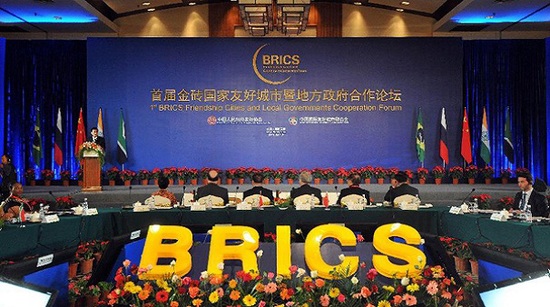Four cities from BRICS nations – Rio de Janeiro, Saint Petersburg, Mumbai and Qingdao – established a partnership in 2008. Durban joined them later, after South Africa became a member of the BRICS in late 2010. The underlying rationale of cooperation is that the BRICS can learn useful lessons about the relationship between growth, poverty reduction and urbanization from each other. The latter in particular poses fundamental challenges to the BRICS’ societies, especially those that still boast large rural populations. While Brazil and Russia are largely urban, a high percentage of China’s and India’s population still live in the countryside.
China’s and India’s long-term economic success will depend on their capacity to manage the inevitable process of urbanization. This challenge is far from trivial. While developed countries in Europe and Northern America urbanized over centuries, China and India are being transformed within a few decades only.
Each BRICS country’s experience with urbanization has its distinct characteristics. In Brazil, failure to prepare for internal migration into the cities gave rise to favelas. China, on the other hand, has taken urbanization seriously in its national development strategy, as it successfully lifted millions of people out of poverty – at the same time, a significant amount of urban dwellers in China also lack permanent residence rights in the cities. Russia is still dealing with the negative effects of centrally planned migration during the Soviet Union, which led to the creation of cities in inconvenient regions with economies that struggle to diversify. India, perhaps worst of all, lacks a coherent approach to managing the growing rural labour force that cannot be absorbed into agriculture. Studying each others’ strategies of how to deal with urbanization the proliferation of mega-cities is bound to be mutually beneficial, particularly for India, which is still largely rural.
A critical observer, of course, will be quick to point out that city officials are not in charge of designing their country’s urbanization policies. All they can thus hope for is to put the issue on the national agenda at home and push for change indirectly.
In 2011, the first “BRICS-friendly city-cum-Local Government Cooperation Forum” was held, with China’s, Brazil’s, Russia’s, India’s and South Africa’s city and local government officials, association leaders people, experts and business representatives pledged to deal with the challenges of urbanization through cooperation and sharing experiences and success stories.
Given that local and regional policy makers lack foreign policy experience (so-called “paradiplomacy” is still underdeveloped in most countries), it is far from certain at this point whether the BRICS friendly city initiative will produce any tangible results. Here, the different political regimes types may play a role: Managing urbanization in authoritarian China is very different from doing so in India’s vibrant and messy democracy, which is why urban projects take much longer to implement. Only time will tell whether bringing together BRICS city officials is a strategy worth pursuing. At first glance, Brazil is not taking the idea very seriously: Rather than participating in the meetings himself, Rio de Janeiro’s mayor mostly sends representatives who are unlikely to have the authority to make wide-ranging decisions. Presidents Lula and Rousseff, by contrast, have never missed a single summit.
Read also:
Russia lays out its vision for the BRICS – others should, too
Agriculture and food security: Brazil’s chance to assume leadership among the BRICS?
The hidden (and nitty-gritty) world of intra-BRICS cooperation: Harmonizing statistics
Photo credit: Xinhua/Hou Jiansen









